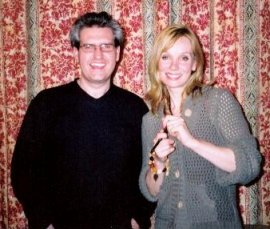An Evening with Mo Hayder
By Paul Kane and Marie O’Regan
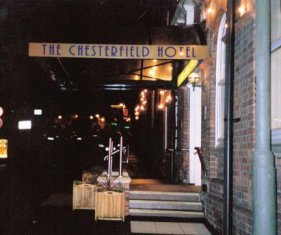
As part of her promotional tour for her new novel, Pig Island, bestselling author of Birdman, The Treatment and Tokyo, Mo Hayder called into the home of the Crooked Spire – and we were fortunate enough to be there for her evening talk and signing. The plush Chesterfield hotel was the venue for the event (in conjunction with Peak Books) and quite a crowd had gathered to hear what the ‘no holds barred’ author had to say for herself. But it was really refreshing to find that she was such a lovely and down to earth person. Travelling with her publicist, Alison from Bantam, Mo began the evening by reading from Pig Island and basically setting the scene for the new story – in which an investigative reporter called Joe Oakes, who makes his living by debunking myths, is drawn to a remote Scottish island because of a religious sect that lives there and a strange apparition that has been seen wandering along the beaches. Of course, he gets more than he bargained for when he discovers that Satanism is involved and it begins to look like everything he’s ever believed in has been wrong.
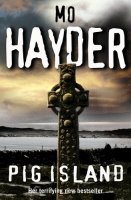
After this, Alison conducted a mini interview with the author, her first question being about the origins and inspirations of the book. ‘Oakesy’ it turns out is inspired by James Randi, who made it his mission to expose supernatural hoaxes, and even demonized Uri Geller. Mo’s Uncle - a chemist and Cambridge don - actually founded a group of philosophers who looked at religious and paranormal beliefs. Randi targeted them and labelled it a cult, giving her a basis for the character in the book. She was also inspired by a Scientologist who used to live next door to her in the States and kept trying to convert her, plus the very disturbing Jim Jones and the People’s Temple who claimed to rid people of their tumours but we simply conning them.
Pondering on the question of this book being a departure from her previous ones, Mo revealed her early love of horror mysteries - in particular that famous icon of the genre, Scooby Doo. “I used to cry when the ghosts were revealed as old man Smithers or whatever,” she told the audience, “But really it’s what I do now.” In the book she sets up quite a lot of supernatural elements then goes on to explain them as real. But that’s not to say there aren’t any genre qualifiers in her work; far from it. In The Treatment, for example, the children call the monster ‘The Troll’ – a creature who walks down walls face first (actually inspired by Dracula). It’s a human monster of course, but in this way the character is given a horror edge.
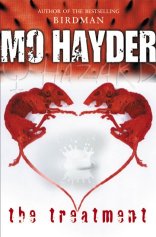
“Do you frighten yourself when you’re writing?” Alison then asked her. “I get more frightened when I do my research,” Mo replied. The writing if anything is a catharsis and exorcises her of the things she’s discovered during her research. Most of the criticism the author has received has revolved around her uncompromising use of violence, so when asked if she’d had to justify this more because she was a woman, Mo took the opportunity to explain. “Yes, I do think I have to justify it more,” she said, then went on to offer her opinion that female killers are often demonized more than their male counterparts – the example of Moors Murderer Myra Hindley for instance. But as to the reason why her stories are so graphic, that boils down to simply telling the truth, she argued.
When researching her first book she visited Ian West, a pathologist at Guy’s hospital who told her all kinds of ways to kill people. “As soon as people find out you’re a crime writer they always tell you lots of ways of murdering someone. I was on a train once and a chemist overheard that I was a writer and he insisted on telling me the best place to inject someone and kill them so the police wouldn’t find out.” But after Ian had showed her various crime scene photographs, in particular the ones involving Colin Ireland, she left feeling angry. “And I was standing outside and thinking to myself, ‘Who am I angry at? I’m angry at Ruth Rendell and P.D. James’.” They’d always withheld images like those in their crime books, so Mo took it upon herself to redress the balance. “I wanted to be honest,” she said, “not close the door on the violence – but face our vulnerability, face death.”
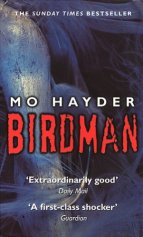
This led rather neatly into a discussion about why people like violence in books and films, and the conclusion was that it speaks to our primal urges – the ones we’ve repressed but which kept our hunter ancestors alive. “After all,” Mo stated, “it isn’t that long ago when we used to go to public hangings.” Alison then asked her how she still had time to teach creative fiction – something she does at Bath Spa University (where she gained her own M.A. in Creative Writing). “Well, the answer is that I don’t. I’ve decided this year that as much as it pains me I’ve got to give it up because I haven’t got the time anymore.” But while she was doing it, she was learning as much as her students and honing her own skills. “I did very well with Birdman so I didn’t have to do it for the money, but I really like talking about narrative structure and characters. I think I’m a bit of a Creative Writing geek!”
To tie up the interview Mo was asked what’s next from her – would we see more from Oakesy in the future. “He’s going to go away and think about his sins for a bit,” she replied. “But I have a new character, a police diver who’s addicted to hallucinogenic drugs; probably not the best combination.” The audience, still chuckling at this, were then told that Jack Caffery from Mo’s first two books would also return in her next one. “All the women fancy Jack,” said Mo with a smile.

It was then the audience’s turn to quiz the author and the first question was about Tokyo and the Japanese culture. Having lived there in the past – Mo was once a hostess at a Tokyo club – she was able to offer a unique inside into their country, and she related a story that summed up the fact that there are still pockets of old Japan that emerge in spite of modernisation. “I was walking home from work one night and two men stumbled out of a bar. They were businessmen and they were having a fight, but they were fighting using old-style kung fu; it was very surreal. It was like this had been put on for the tourists or something, but actually these guys were really going for it and knocking lumps out of each other.”
Mo was then asked by someone from the back who worked in crime protection whether she felt she’d be able to compartmentalize enough to work in these kinds of areas herself. “No, I don’t think I would,” said Mo, who then asked the woman, “Do you ever find yourself that the compartments crack at about three in the morning when you can’t sleep?” And it was really interesting to note that however much we try and push things out of our minds they do return and resurface eventually. Mo was then asked if she thought she had a responsibility to drag out such things into the light, which fed into the question about honesty earlier. “I’ve never thought about it that way. My main aim is to entertain, but I think it’s important to be truthful with readers.” One audience member then suggested that violence thresholds had gone up over the years and that Mo probably wouldn’t have got away with a lot of what she’s written twenty-five years ago. “Oh definitely,” she agreed. “No publisher would have touched that content back then.”
Musing on how writing has changed, Mo told us that she’s been asked to introduce one of the new Penguin editions of Ian Fleming’s Bond books. “I chose You Only Live Twice,” she said, “but it’s strange to see how that kind of fiction has changed because people are more travelled and more aware these days. Where Fleming would have spent some time describing a Caribbean Island, because not that many people would have seen one back then, now you can do it in just a few words.”
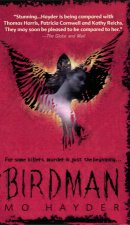
But are there any topics she wouldn’t personally go near herself? one person wanted to know. “No is the simple answer,” Mo said smiling. “I find taboos quite destructive. There aren’t any taboo subjects, just taboo ways of dealing with them…” Besides which, her fiction provides a way for good to triumph over the bad, like a safety valve. Finally, to wrap up, Mo was asked why she thought men shied away from writing extreme violence in books. “Because they don’t feel they can get away with it, like female writers. Being a woman is quite a nice shield because people don’t think you’d be capable of such acts. Men would be accused of exploiting it, especially if it was about sexual topics. And of course there are a lot of female fans of crime; I think women are quite intrigued by the whole thing.”
Just as we were by the entire evening. We had a great time listening to this knowledgeable writer and after all the applause he died down, Mo sat and signed books for the fans, chatting to them about various topics as well. Peak Books announced that there are more events due shortly involving other authors, so we’ll definitely keep an eye out for them. In the meantime we’ll be devouring Pig Island and waiting patiently for the next excellent novel to come from Mo Hayder.
